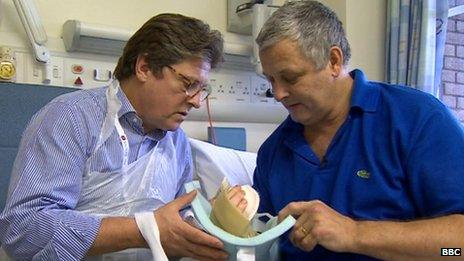UK's first hand transplant operation
- Published
- comments

Mark Cahill, right, can wiggle the fingers on his new hand
A former pub landlord from West Yorkshire has become the first person in the UK to have a hand transplant.
Mark Cahill, who is 51, had been unable to use his right hand after it was affected by gout.
Doctors say he is making good progress after an eight-hour operation at Leeds General Infirmary.
It is still very early to assess how much control of the hand will be gained - so far he can wiggle his fingers, but has no sense of touch.
'My hand'
Mark Cahill, from Greetland near Halifax, said: "When I look at it and move it, it just feels like my hand.
"Right now it feels really good, it's not a lot of pain, it looks good, it looks a great match and I'm looking forward to getting it working now."
Mr Cahill's new hand is still bandaged up, but he can already move his fingers. It is hoped that with time he will gain much greater levels of movement and sensation.
He developed gout in his toes and feet 20 years ago. Five years ago it spread to his right hand leaving him unable to open his fingers or use his hand for anything.
One option would have been a bionic hand, but he volunteered for the pioneering surgery.
As well as being a first for the UK, it was also the first time a recipient's hand has been amputated during an operation to attach a donor hand.
The fresh cut, made where you would wear a watch, allowed surgeons to connect nerves in Mr Cahill's arm with those in the donor hand with great precision - along with the bone, blood vessels and tendons.
The operation took place on 27 December when a donor hand became available.
Mark Cahill's old hand swollen by gout
'Extremely challenging'
Prof Simon Kay, a consultant plastic surgeon at the hospital, said: "The team was on standby from the end of November awaiting a suitable donor limb, and the call came just after Christmas.
"It was extremely challenging to be the first team in the UK to carry out such a procedure.
"It is still early days but indications are good and the patient is making good progress."
He also paid tribute to the donor and their family.
Leeds General Infirmary already has a reputation for reattaching hands which have been accidentally cut off.
This operation has been planned for more than two years and the hospital was in touch with plastic surgeons across the country looking for people who might be suitable.
Potential patients had to be assessed - both physically and psychologically - to ensure they were suitable for the procedure.
The surgical team also liaised with surgeons in France who performed the first hand transplant in 1998.
'Mentally detached'
The first recipient was Clint Hallam, from New Zealand, who had lost a hand in an accident with a circular saw more than a decade earlier.
He later had the hand removed, complaining it was like a dead man's hand with no feeling in it.
He said he felt "mentally detached" from the transplant, which was wider and longer than his own. The skin was also a different colour.
Clint Hallam received the world's first hand transplant
Surgeons do try to find hand transplants which are a close physical match to a patient, however, they are very visible, unlike a transplanted internal organ such as a kidney.
Ensuring a patient is prepared for the mental challenge of living with a hand which is not their own is considered as important as the surgical element of the transplant.
More than 60 hand transplants have been carried out around the world.
Prof Norman Williams, the president of the Royal College of Surgeons, said: "This is yet another example of life-changing surgical advancements that are now possible."
"As with all procedures that improve the quality of life rather than save it, there is an ethical balance to be struck - especially as the lifelong anti-rejection medication that the patient would need to take carries its own risks.
"Care always needs to be taken in choosing suitable patients who understand the risks and benefits."
- Published21 March 2012
- Published2 November 2011
- Published27 November 2012